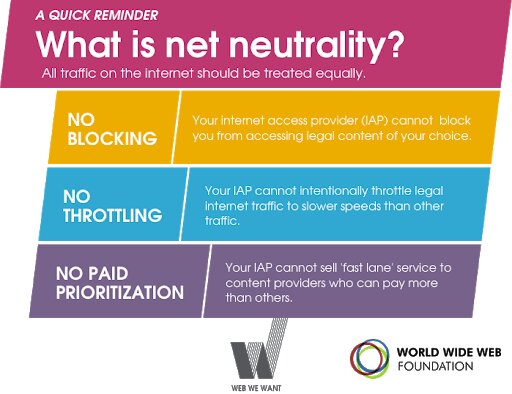Governance
Multi-stakeholder Body for Net Neutrality
- 23 Sep 2020
- 4 min read
Why in News
Recently, the Telecom Regulatory Authority of India (TRAI) has recommended the creation of a multi-stakeholder body (MSB) to ensure that Internet access providers adhere to the provisions of net neutrality.
- The MSB should be set up as a non-profit entity.
Key Points
- Roles and Responsibilities:
- To provide advice and support to the Department of Telecommunications (DoT) in the monitoring and enforcement of net neutrality principles.
- To investigate complaints regarding the violation of net neutrality.
- To help DoT in the maintenance of a repository of reasonable traffic management practices.
- Stakeholders:
- It could include telecom service providers, Internet service providers, content providers, researchers, academic and technical community, civil society organisations, and the government.
- Net Neutrality in India: The DoT accepts TRAI’s recommendations in favour of net neutrality which:
- Bars telcos from discriminatory treatment on the web, based on content, sender, receiver, protocols or equipment.
- Penalises for violation of license rules on net neutrality.
- Includes exceptions for critical services such as remote healthcare diagnostics, self-driving cars, etc.
- Exempts content delivery networks, which do not use public Internet from open web rules.
- Applies equally to 5G technology as well because the principles are technology-neutral.
Net Neutrality
- Net neutrality has been defined as a principle that Internet Service Providers (ISP) also called Internet Access Providers (IAP) should enable access to all content and applications regardless of the source, and without favouring or blocking particular products or websites.
- This means when the customers pay an ISP for a data plan, they should be able to access all content online (news, social media, videos, games, etc.) at the same broadband speed which they had opted for.
- Arguments in Favour:
- It democratises the internet space as the telecom provider cannot charge differently for different websites and allows everyone on the internet to participate in it.
- It does not let ISPs to act as “gatekeepers” and control, filter or block data according to their will without a court order.
- It provides a level playing field to all the big and small companies in the Information Technology (IT) sector and does not let a handful of companies control the internet.
- It ensures that all people and websites have equal access to each other, regardless of their ability to pay hence fosters the principle of freedom of speech.
- Arguments Against:
- It will stifle innovation on the internet as it will not be possible to explore consumer choices and create content accordingly.
- ISPs will not be able to make an investment in Broadband services.
- It will kill competition as every data packet will be treated the same and content providers will not get a chance to advance their data at a better rate by paying the telecom providers.







